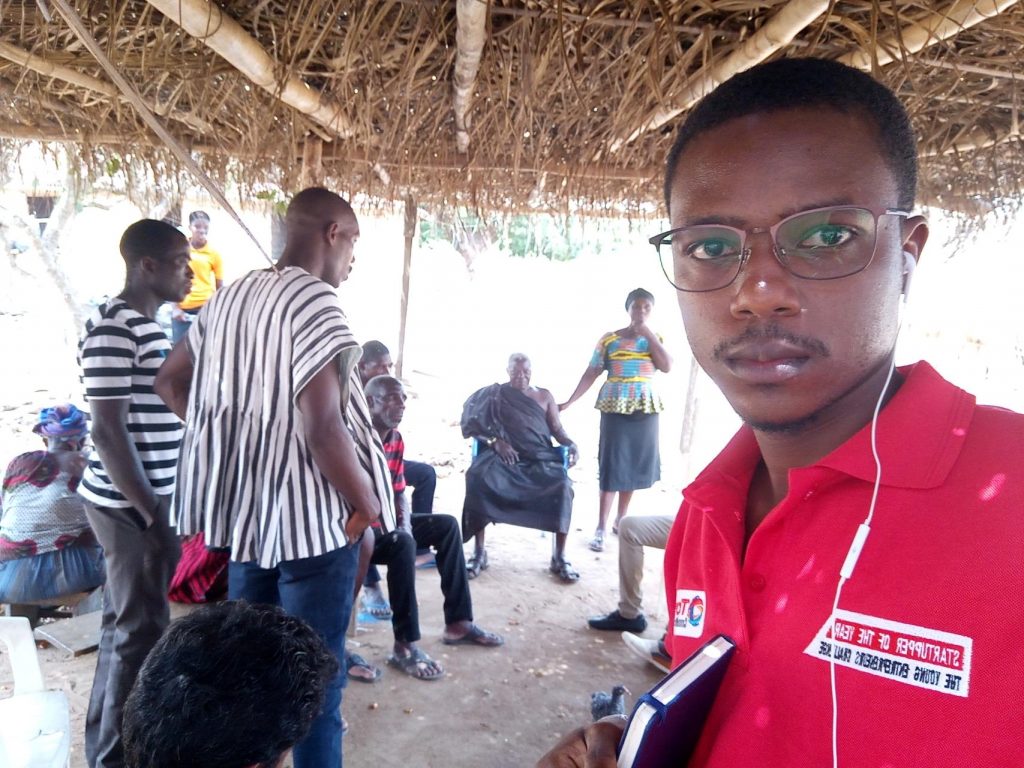The role of integrated partnerships in the development of sustainable water and sanitation solutions – An interview with Jacob K. Amengor
Photo: Jacob Amengor (second from left), after being awarded the 2018 IWA Young Water Professionals Award at the IWA World Water Congress & Exhibition in Tokyo, Japan.
Integrated collaboration of multidisciplinary teams is fundamental to address the challenges at the interconnection among water, sanitation, and energy. Effective partnerships provide opportunities to develop innovative solutions to the global water problems. How have partnerships among different organisations and across disciplines contributed to the efforts to achieve the Sustainable Development Goals? How can Young Water Professionals take advantage of the opportunities provided by cross-sectoral partnerships? How to achieve effective collaboration? Jacob Kwasi Amengor, Assistant Water Quality Assurance Officer at Ghana Water Company Limited and Winner of the 2018 IWA Young Water Professionals Award, shares with IWA his perspective on the role of cross-sectoral partnerships in the development of integrated water and sanitation solutions, as a preamble of his keynote speech on 26th June, 2019, at the 9th International Young Water Professionals Conference in Toronto, Canada.
 I strive to see an Africa where access to clean water and sanitation is no longer a privilege for a few, but rather a human right for all, regardless of place, socio-economic status, gender, ethnicity, disability or age.
I strive to see an Africa where access to clean water and sanitation is no longer a privilege for a few, but rather a human right for all, regardless of place, socio-economic status, gender, ethnicity, disability or age.
How cross-sectoral partnerships are helping implement integrated water and sanitation solutions?
Cross-sectoral partnerships are alliances established between organizations from two or more sectors that commit themselves to sharing risk, costs and benefits involved in working together to develop and implement specific intervention to identified challenges. Considering the many ways in which society interacts with water, there are a lot of sectors with overlapping responsibilities and interests in the water and sanitation sector. Therefore, in designing water and sanitation solutions it is necessary to consider a lot of factors, including culture, religion, literacy, and technology. Among those, of particular relevance are religion and culture, because these are vital parts of people’s lives, and solutions provided that are against these will be futile and unsustainable. Gender and generational differences, which have much influence on social habits, are also decisive factors in determining the successful planning and operation of water and sanitation systems. This means assessing the social habits of users increases the potential of success and formation of stronger partnerships and collaboration that mitigates the risks of failure. For instance, UNICEF and WHO are working together in partnership with governments, health care facilities and water utilities to improve the water, sanitation and hygiene situation in health facilities through the Water, Sanitation and Hygiene Facility Improvement Tool (WASHFIT). It is also notable the growing collaboration between the water and the digital industries, which has contributed to innovations such smart water metering, electronic billing, electronic payment systems and many more. Undoubtedly, cross-sectoral partnerships are maximizing the efforts being made by the water and sanitation industry to achieve universal access to clean water and sanitation.

Jacob Amengor, winner of the IWA Young Water Professional/Emerging Leader Award 2018, carrying out community engagement with iWASH Africa in the Volta Region of Ghana
What skills should Young Water Professionals (YWPs) develop to facilitate strong and effective partnerships and what tools can they use to connect locally and globally?
To make meaningful impact in the WASH sector, it is necessary for YWPs to form partnerships among themselves and collaborate with senior professionals and organisations. To form strong and effective alliances, YWPs have to develop networking skills to expand the number of people they positively impact, and develop interpersonal communication skills they can rely on to form partnerships. Research skills are very important for YWPs to come up with relevant knowledge that can be used to improve existing WASH interventions or invent new ones. YWPs need to master the art of public speaking to effectively communicate their work in the water sector and to make reasonable contributions to WASH policies and frameworks.
The internet is a great tool that is helping to connect people across the globe. For YWPs, I would recommend IWA Connect, which has a great network of both senior and young water professionals that they can connect with and learn from. IWA Learn also presents an amazing platform for professional development with lots of relevant online courses and webinars that are equipping water professionals to achieve the objectives of the Sustainable Development Goal 6 (SGD 6). Social media such as Facebook, Twitter, LinkedIn and WhatsApp are great channels for YWPs to connect among themselves, to gain easy access to cross-sectoral and global knowledge and resources on WASH issues. For instance, I initiated in 2015 the Water Satellite Programme, which seeks to educate people on best practices in water, sanitation and hygiene in an all-inclusive and sustainable way starting from Ghana, and pursuing to expand to the whole of Africa. I have used Facebook as the main medium for carrying out the objectives of the Water Satellite, reaching an international audience.
Looking beyond 2030, how do you think cross-sectoral partnerships would have evolved and adapted from the SDG lessons learned?
Four years into the SDGs, there is no doubt that collaborations and partnerships have come up as key to reaching the set targets. Looking beyond 2030, I foresee unsustainability as the main challenge, if the WASH interventions being implemented are not done considering integration as a key pillar. I see cross-sectoral partnership as one of the key roots of any successful WASH intervention. Cross-sectoral partnerships are not only going to be the underlining factor of success, but they are going to form the basis for the post 2030 goals that will be set.

